With its beautiful coat coloration and high energy, it is no wonder that the Bengal cat attracts cat enthusiasts and pet owners worldwide.
This cat breed was specifically bred with wild cats to capture a natural-born predator’s high energy and high intelligence.
Often, the Bengal cat is labeled as a highly aggressive act toward people and animals alike.
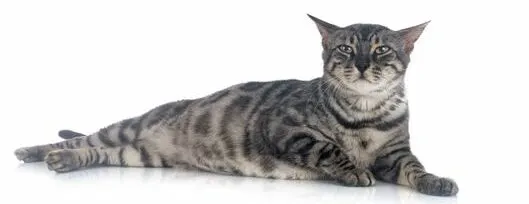 While the Bengal cat should not be trusted with other cats and animals, due to its extreme territorial nature, the Bengal cat is not aggressive toward people.
While the Bengal cat should not be trusted with other cats and animals, due to its extreme territorial nature, the Bengal cat is not aggressive toward people.
This cat has a high-energy and prey drive which could be misinterpreted as aggressive. Playtime should always be monitored and corrected if play and biting turn aggressive.
The Bengal cat is a relatively new breed of domestic cat that retains close ties to its wild relatives. This cat is extremely territorial and will often combat other cats infringing on its self-proclaimed territory.
For this reason, the Bengal cat should not be housed with other domestic cats in the home and should be kept indoors.
Its extreme prey drive, hunting ability, and territorialism can wreak havoc on residential neighborhoods and wildlife. Always keep the Bengal cat indoors to be closely monitored around other people and pets.
Are Bengal Cats Aggressive with People?
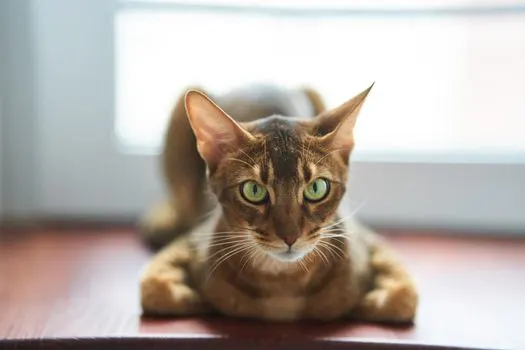 The Bengal cat breed is often misunderstood due to its lively nature and close ties with its wild ancestors. This cat is extremely athletic and is a natural climber.
The Bengal cat breed is often misunderstood due to its lively nature and close ties with its wild ancestors. This cat is extremely athletic and is a natural climber.
They are curious and have a strong prey drive. Everything from their day-to-day activity to their playstyle is active and revolves around mimicked hunting.
It follows then that, unfortunately, this cat is often labeled as an aggressive cat, even toward people.
In reality, the Bengal cat is an extremely affectionate cat. They are highly intelligent and enjoy observing everything around them.
While this cat won’t sit in your lap and come to you for cuddles, the Bengal cat thrives with human interaction and loves to have people nearby for playtime.
The Bengal cat is not usually considered aggressive toward people but should be observed when interacting with other animals.
Are Bengal Cats Aggressive with Other Cats?
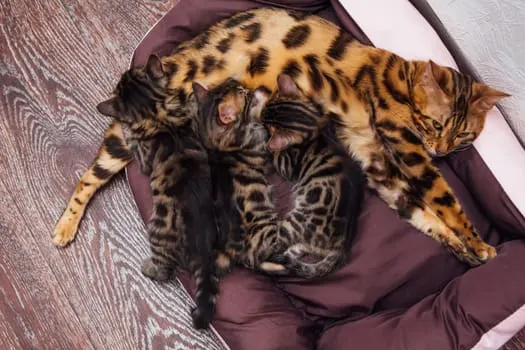 Bengal cats are wonderful pets but should probably be kept as the only cat in the house. This type of breed tends to be extremely aggressive toward other cats.
Bengal cats are wonderful pets but should probably be kept as the only cat in the house. This type of breed tends to be extremely aggressive toward other cats.
Much of this personality type is due to the Bengal cat being very territorial. As such, the Bengal cat will go out of its way to injure cats that may infringe on its territory.
The Bengal cat is very powerful and can hunt and kill. If left unattended, the Bengal cat could potentially harm another cat breed that enters the domain the Bengal cat has declared its own.
The Bengals’ extreme territorial nature is a significant reason why this cat should not roam outdoors in residential areas.
Can Bengal Cats Be Trusted with Other Animals?
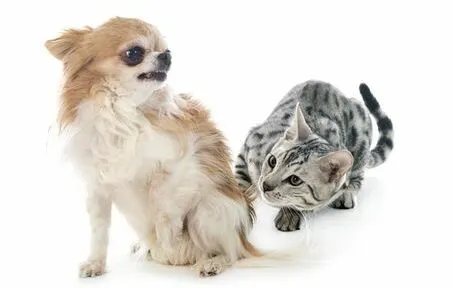 The Bengal cat is beautiful to look at and makes a wonderful, affectionate pet. However, this cat breed is a natural hunter and has very strong predatory instincts.
The Bengal cat is beautiful to look at and makes a wonderful, affectionate pet. However, this cat breed is a natural hunter and has very strong predatory instincts.
The cat is powerful, athletic, and has a strong prey drive. It follows that this type of cat should not be trusted by other animals.
Avoid pairing the Bengal cat with other cats and small rodents like rabbits, guinea pigs, hamsters, or gerbils.
Because the Bengal cat enjoys hunting, you may even want to keep a close eye on your cat when it is around the fish in your aquarium.
Why Do Bengal Cats Bite?
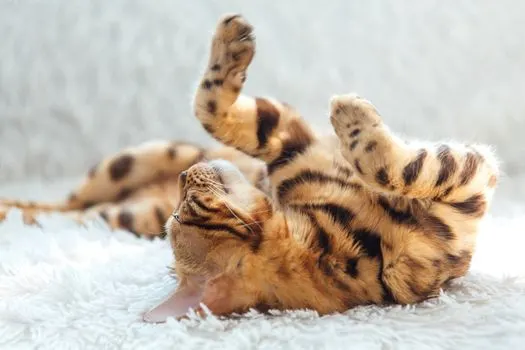 The Bengal cat is an extremely athletic and lively cat that often engages in rough play. Although most of the time, play is innocent, some errant bits may be too hard or cause injury.
The Bengal cat is an extremely athletic and lively cat that often engages in rough play. Although most of the time, play is innocent, some errant bits may be too hard or cause injury.
Some people misinterpret this cat’s play as aggression, but there are sound and rational reasons to explain why the Bengal cat bites. Some possible reasons for a bite include:
- Boredom – Your cat may simply be bored, and biting offers a new and exciting activity. Cats like to hunt and use their mouth and teeth as a set of hands. Your cat biting at your hand, toys, or furniture could simply be another activity to help keep your cat occupied.
- Play – The Bengal cat is extremely active and likes to engage in high-energy playtime. Sometimes, this cat’s play translates to biting, which could be interpreted as aggression. Always keep an eye on how hard your cat bites during play. If biting is too much, corrective action may be needed to stop the behavior.
- Curiosity – As a natural hunter, the Bengal has plenty of innate curiosity. A simple movement or change in position could be just enough to make this cat pounce and explore the movement. A sudden hand movement or shift in position could trigger a pounce and bite from your cat.
- Kitten Bites – Young kittens need to learn their boundaries and will often bite to test their new, sharp teeth. A mother cat will let her kittens know when a bite is too hard to allow them to better differentiate between an aggressive bite and a play bite. Young kittens will frequently bite, but it is up to you as the owner to encourage safe yet active play.
How Do I Know When Biting Is Too Much?
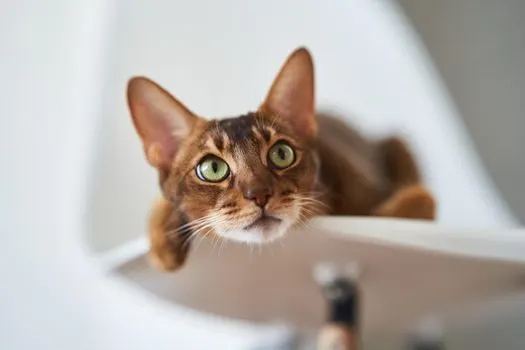 Bengals, by nature, enjoy rough-and-tumble play and are known to gently nip at their owners’ hands during a lively play session.
Bengals, by nature, enjoy rough-and-tumble play and are known to gently nip at their owners’ hands during a lively play session.
When is biting too much, though, and when should owners take corrective action? To determine if biting is too much, consider the following:
- Does the bite hurt too much? Are you in pain from a “play” bite?
- Are other animals in the house upset by the Bengal’s biting?
- Are other people in your home hurt from biting?
- Are you bleeding?
If you have answered “yes” to any of the above questions, it may be time to reconsider your play method with your Bengal.
Although this is an affectionate cat, it does have a strong prey drive and can be rough during playtime.
How Can I Correct Biting?
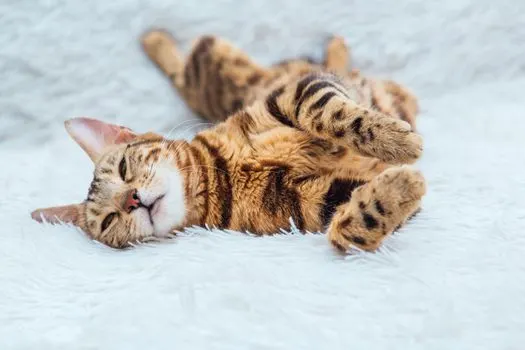 Playing with a Bengal can be rough, and this breed of cat likes to use biting as a form of play. Sometimes, play bites can get too rough, and the situation can escalate.
Playing with a Bengal can be rough, and this breed of cat likes to use biting as a form of play. Sometimes, play bites can get too rough, and the situation can escalate.
It is important to stop a biting kitten or cat and immediately correct the behavior. Kittens that bite too hard during play will quickly grow into adults that bite too hard.
To correct biting behavior in your Bengal, you can try:
- Other Options – Try to offer another solution when your kitten or cat is biting too hard during playtime. Give your cat a different toy to play with to distract them. This way, your cat can find an appropriate item to bite, leaving your hands safe.
- Stop Play – If your cat isn’t easily distracted and continues to bite your hands during play, immediately stop playing. The punishment of ending your cat’s fun time is usually enough to teach your Bengal that playtime can be rough, but not so rough that you are left hurt or injured.
- Loud Noise – When playtime is too rough, you’ll often need to get your cat’s attention to break the biting cycle. Try to clap your hands or make a loud noise to get your cat’s attention. A loud “NO!” is usually enough to deter your Bengal from biting.
- Alpha – Bengals are extremely dominant cats, so sometimes it is necessary to play the role of the alpha animal in the house. When your kitten is still young, try to growl at it when biting becomes too hard. The growl mimics how the mother cat would let her young kittens know when biting is too hard.
Related Questions
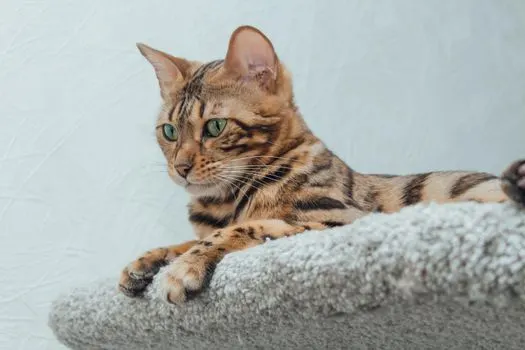 Are Bengals related to wild cats?
Are Bengals related to wild cats?
No matter how tame, every cat is related to cats found in the wild. However, Bengal cats may be a little more closely related to wild cats.
This breed was made by breeding Asian leopard cats with domestic cats. The first documented breeding occurred in the early 1800s, making them less removed from their wild ancestors.
The appeal to the Bengal breed is that it blends the personality of a domestic cat with a wild cat’s elegance.
Do Bengal cats like being held?
Bengal cats are known to be extremely affectionate, continuously seeking out their humans for attention. But, just because this cat loves it does not mean this cat likes to snuggle.
You’ll rarely find a Bengal cat sitting in a lap, and in general, these cats do not like to be held. If you try to pick up and hold your Bengal, the cat will usually resist and squirm away and resist your attempts.
Instead, show your Bengal cat affection by playing with it or simply petting your cat as it walks by. Participating in endless hours of play is the best way to share affection with your Bengal cat.
Related Guides
Our team is composed of pet care professionals, veterinarians, and pet owners. To date, we’ve conducted thousands of hours of research to publish the most accurate pet information.
Most of the writers on our site are vets with 10+ years of clinical experience, ranging from small practice, to equine practice, academia, and surgery. Our goal is to help every pet owner get the information they seek about their dear companions.

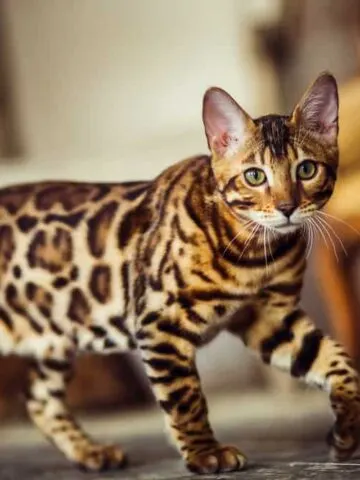

Leave a comment
You must be logged in to post a comment.